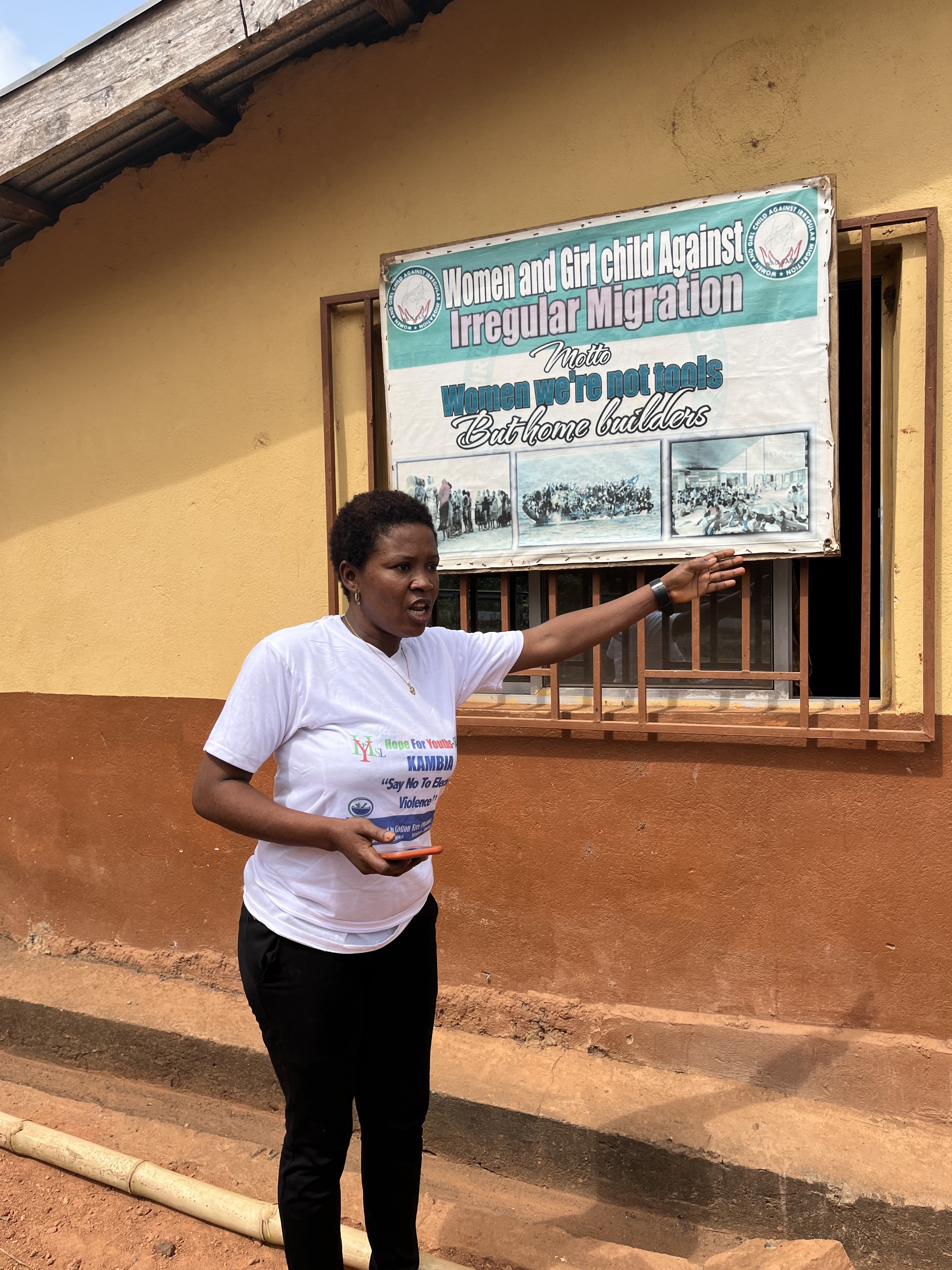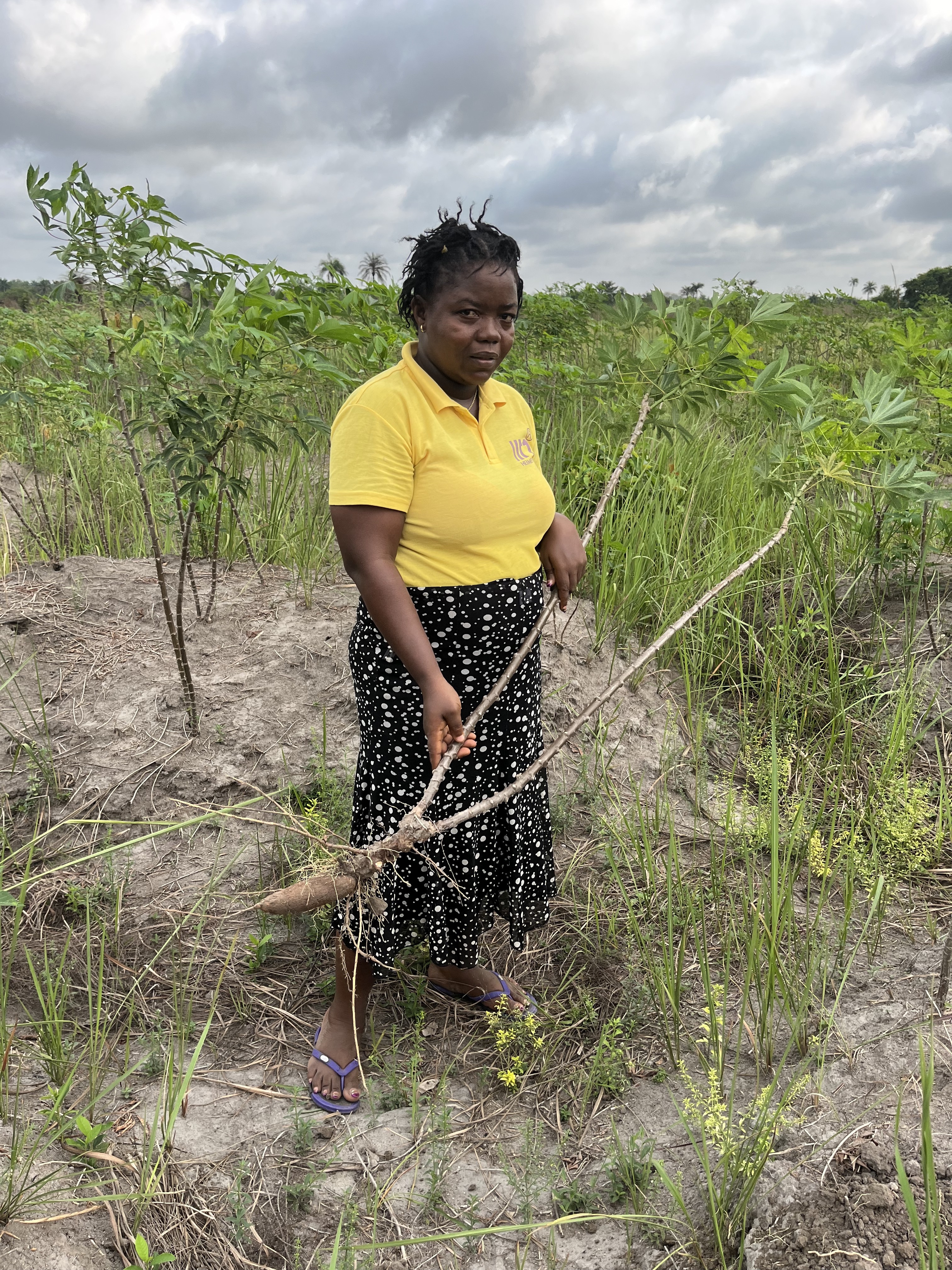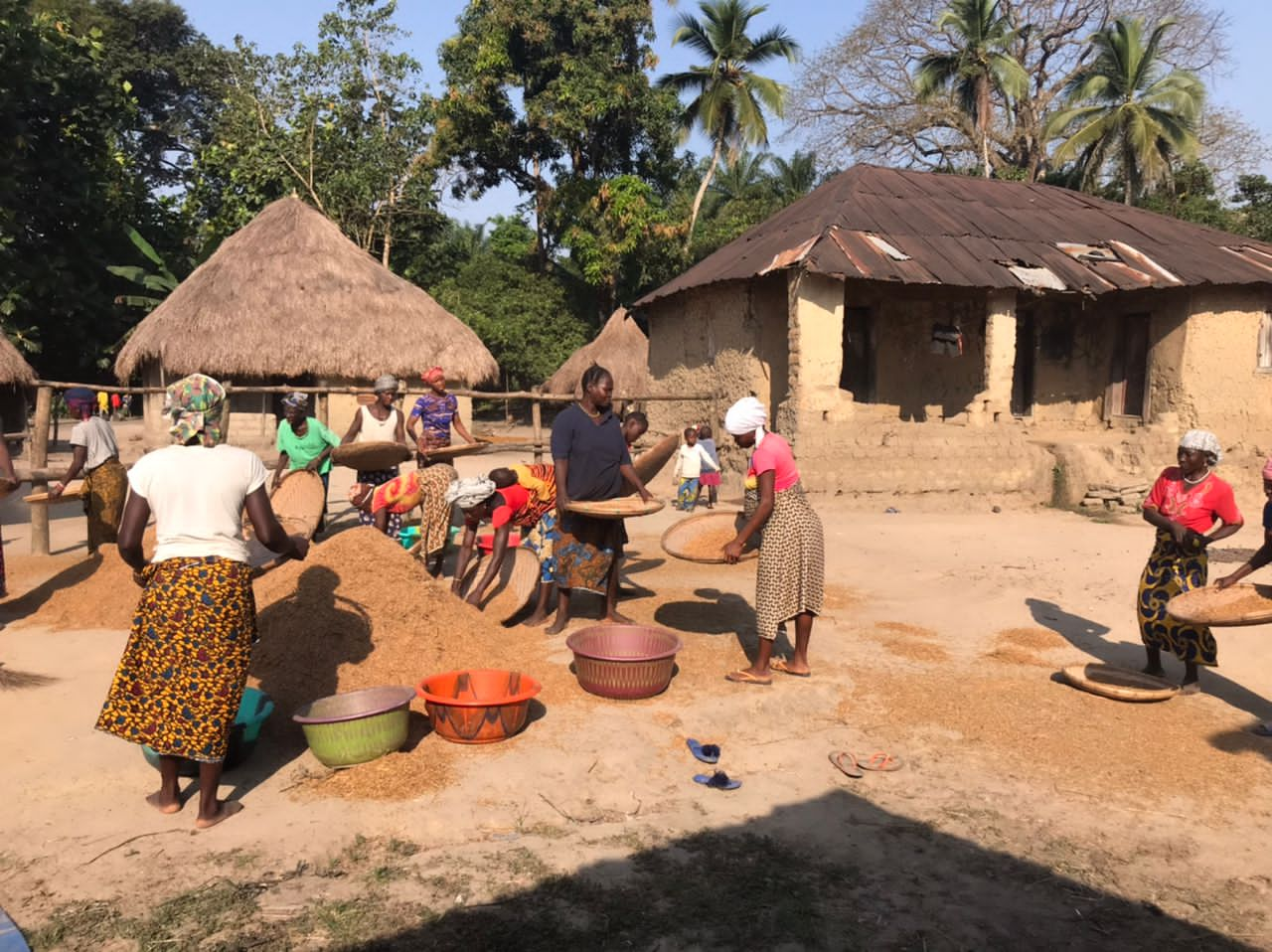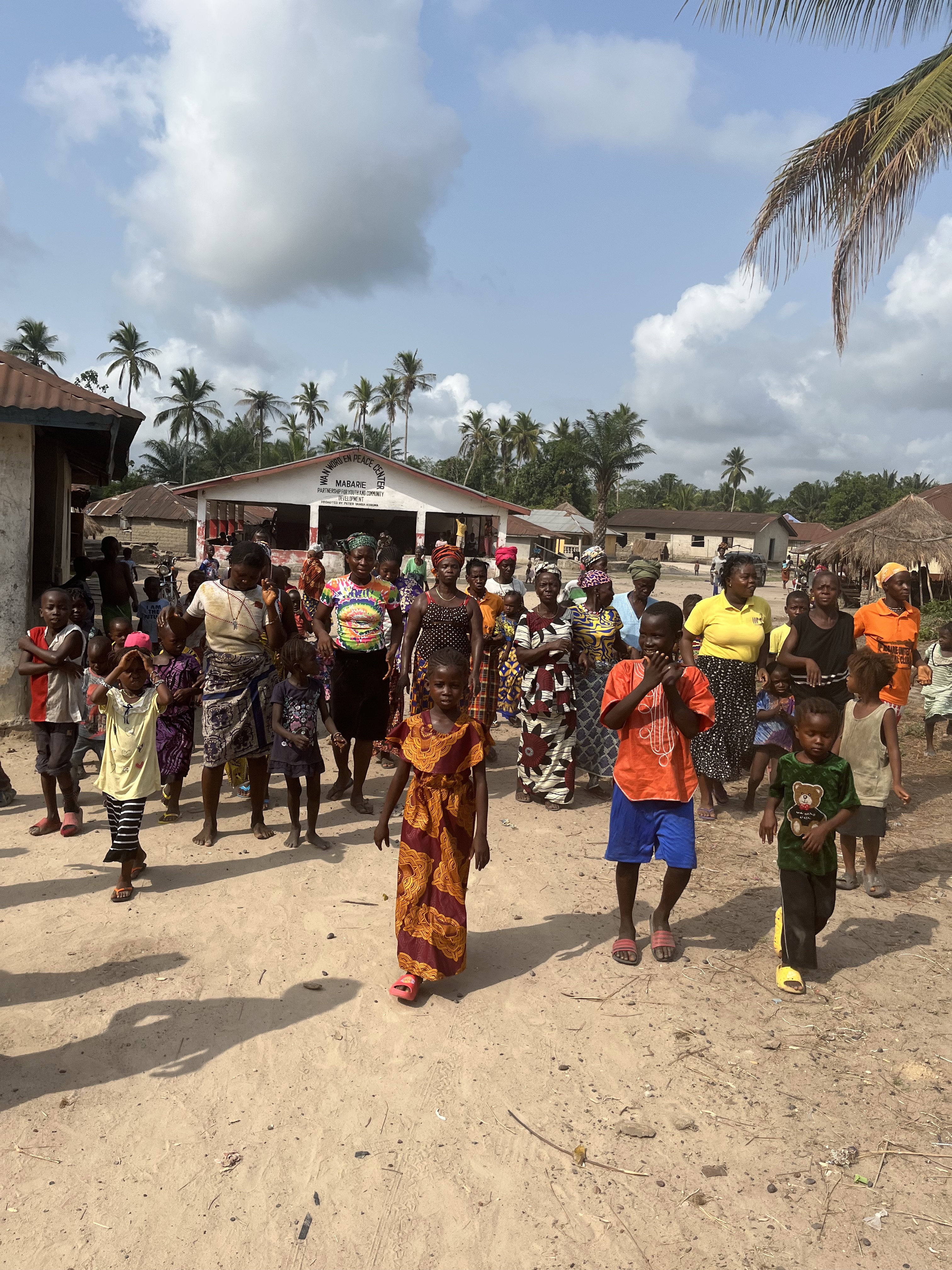Battered not beaten, Sierra Leonean women pick up the cudgels
Electric shocks and starvation fuel the activism of trafficking victims
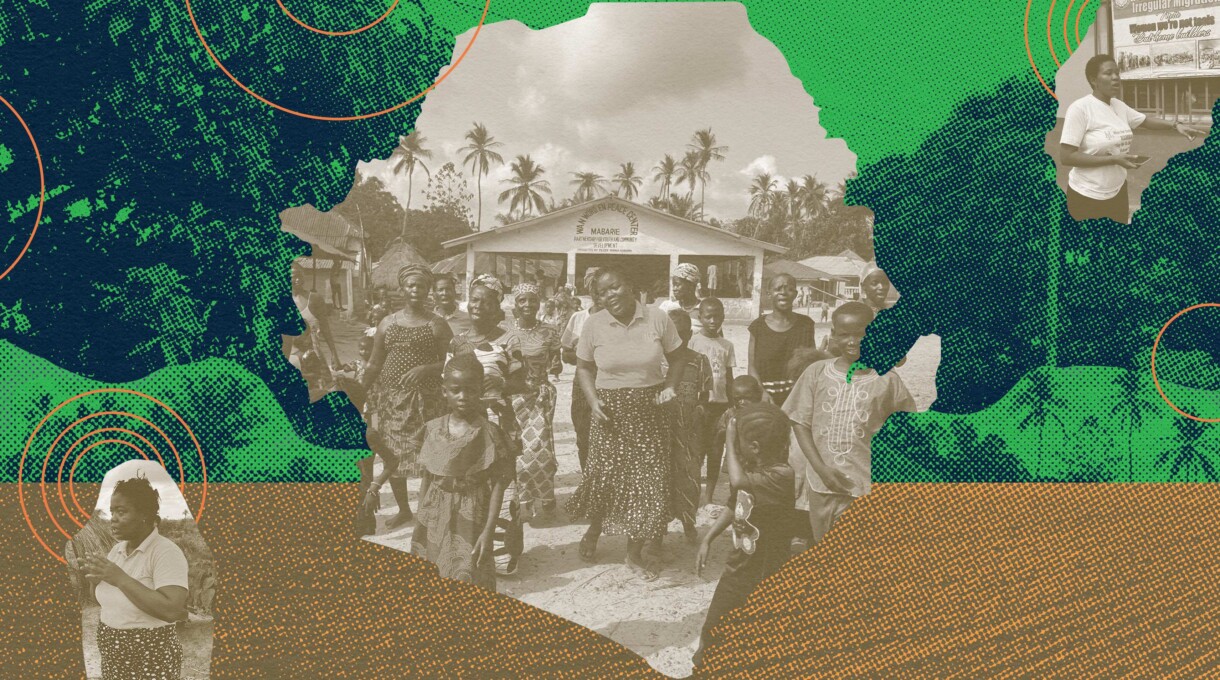
Just because they share their story does not mean they trust you. Even as those who returned after being trafficked share parts of their journey, they are wary of the listener’s intent. Yet, they stay and speak, and over the months they develop a level of trust with some of their compatriots and see themselves as a catalyst for change – someone who can prevent what happened to them from happening to another. Mariamma Bundu works with those who have been trafficked, helping them move from trauma to trust to advocacy.
Bundu’s office-cum-living space is in the border town of Kambia, a short distance from Guinea. Her organisation, Women and Girl Child Against Irregular Migration (WAG-CAIM), is strategically located, but the area carries distant memories of a simpler and more hopeful period of her life. Adjacent to the office is the Maria Hotel, on the banks of the Kolente River. She worked as a manager at the hotel for many years until she was tempted into a program – a job offer in Australia. On the day of the interview, there is a lot of activity around her office. Bundu and her team are involved in democracy and election awareness as the country geared up for its general elections. She strides around, an instruction here, a suggestion there, before she sits down to talk about her journey to Kuwait. The room clears out without her request, and the tears flow non-stop – but with every line she utters, the tears take on a different character. Anger, frustration, grief, fear… but at no point does she care to evoke pity for her situation. Trafficked, abused at work, imprisoned and then called crazy, she has seen and experienced more in the last five years than many would in a lifetime.
In 2015, she managed to scrape together US$1500 for the job in Australia. But when she reached the airport in Conakry, Guinea, she was given documents in a language she did not recognise. She was headed to Kuwait, and she had no choice but to make a go for it.
When she landed in Kuwait, her passport, along with all her stuff, including her phone, was taken away. She was put to work she had not signed up for and made to sleep in the bathroom. “When I demanded they return my passport, they said they buy me, and I had to just work.” Bundu ran away but the agency “sold her to one house and another,” she says. At the end of four months of working in different homes but never being paid, she made one last-ditch attempt to escape. “My madam’s brother was a soldier, and he threatened me with a pistol and wanted to rape me. I left everything and ran, and managed to get into the government shelter.”
The shelter (run by Kuwait’s Public Authority for Manpower in Jleeb Al-Shuyoukh) was a brief reprieve, “a privilege,” she says. Bundu received food and a place to sleep. “But I was not being released. I was stuck there. So I started my advocacy from within. I borrowed another person’s phone and started communicating with a radio station in Sierra Leone telling them about the plight of my sisters in Kuwait, demanding the government help us. There were more than 200 of us there at the end of 2015 and early 2016.”
With every line she utters, the tears take on a different character. Anger, frustration, grief, fear... but at no point does she care to evoke pity for her situation. Trafficked, abused at work, imprisoned and then called crazy, she has seen and experienced more in the last five years than many would in a lifetime.
The heavy hand of law enforcement in Kuwait
The attention she drew to herself and her situation had dire consequences. “I was taken from the shelter and put in a prison. I did not even know what I did wrong. They only told me I had committed a crime. What crime? They had no answer. Only one time the embassy official visited me. One time there was a court hearing.”
In recounting her prison experience she relives the worst phase of her life, but refuses to end the interview. “There was no food, no water. If you bleed, it would just flow, then be punished for messing up. We were made to work, wash vehicles, to even earn the water to drink. Worst was the current. They gave us shocks.”
She was moved around to eight different prison locations and in two of those places she received electric shock treatment, Bundu says. “There was a wall that we were forced to touch, and upon contact, we would receive shock waves throughout our body. That was our punishment for crying or shouting. Their way to control us.”
In these cramped prisons, 50 to a small room, there were Ethiopians, Filipinos, Ghanaians, Indians and many other nationalities, and most of them did not know why they were imprisoned and were only told “you have a crime. Be here, die here.”
She repeats that the shelter, where she spent the first few months after escaping her workplace, was a privilege. Bundu recalls her story in no particular chronology, often linking a certain emotion and experience to different periods of her ordeal. “In Kuwait, you will see different people sitting there and crying,” – ‘there’ is the airport arrival and departure halls, the streets, the shelter, the prisons, the agency office. She spent half of her three-year stint in Kuwait in different prisons, another six months in the shelter, and her longest stay was at the deportation centre for eight months. All because of the abuse she endured during the four months she worked, and finding no justice when she sought it.
She carried her anger and indignation back to Sierra Leone, fuelling the course of her work. “I started my advocacy at the Lungi airport. I was scared to go home, but I was also seeing girls going from there. I was telling everyone there ‘don’t go to the Gulf,’ and people thought I was crazy. But we are sisters with the same struggle, I can’t give up.”
Now, a few years later, her advocacy is more strategic and better-planned. She and her team go to schools and marketplaces in different towns, sharing their experiences, and educating young women. A commonality and solidarity she shares with Lucy.
She points in the northwest direction of her office, “It is easy to cross the Guinea border, just 10–15 minutes from here, but it’s difficult to stop them, especially at the border when they are so close to leaving. So I have learnt to speak to them in a way that they see reason.”
Every day Bundu opens the raw, never-healing wound by making herself vulnerable and sharing her experiences, so that she can break some cycles of exploitation at least. “The traffickers use bikes. They will ride the bikes, the women will sit behind. And they will dress locally, not like they are going to travel… who will know they are trafficking you?”
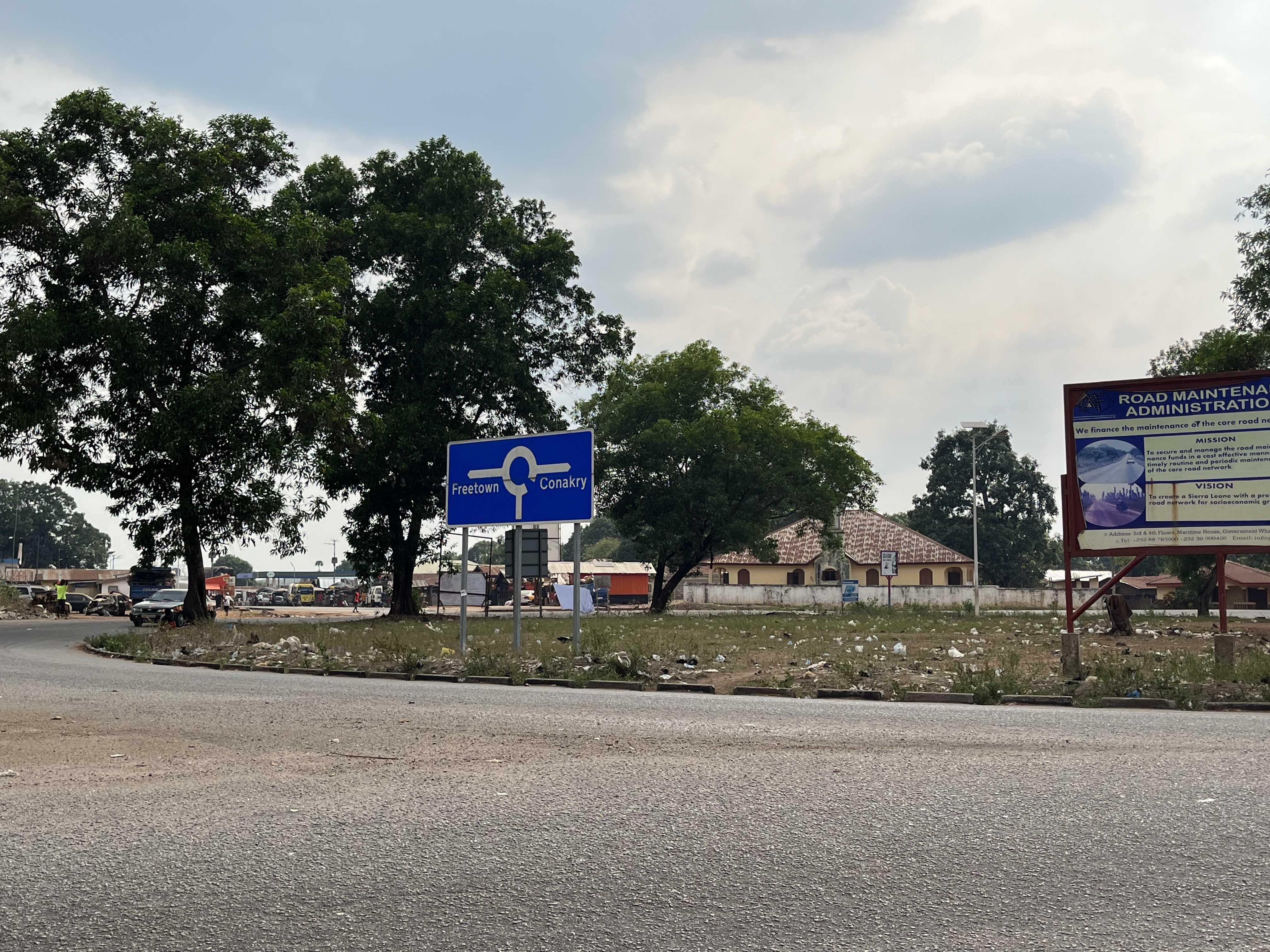
The point of no return. Once victims of trafficking cross this point, there’s little local officials and activists can do.
She intervenes at this point. “I will call my sister – ‘come, where are you going?’ and with that a conversation begins.” It also places Bundu in the crosshairs of the traffickers. “They have broken into my office once and destroyed everything. The last time when I was at the marketplace I heard them enquiring about me. Who I was.”
Corruption is rife, and some law enforcement officials are often on the take of the traffickers, to pretend ignorance when it is obvious women are being trafficked, according to both Lucy and Bundu. And as if to prove this, there are check posts every kilometre or so, and the cops are not subtle about asking for money.
“There was a wall that we were forced to touch, and upon contact we would receive shock waves throughout our body. That was our punishment for crying or shouting. Their way to control us.”
Bundu understands the frustration of those who return, already battered and disillusioned, more impoverished than before, since they don’t have a vocation or support system to earn a living, making them vulnerable to another program, to another ill-thought migration.
For instance, in DoWAN, close to 100 women – victims of trafficking – have (and continue to) benefit from these facilities. The women are now the storytellers and peer educators, actively advocating against trafficking. To turn the narrative of poverty and desperation into one of resilience and recuperation. But it is not a foolproof exercise.
“Jennifer worked with us on educating people, and one day she herself fell into the trap and ended up in Oman. She started calling me and wanted to come back. She was lucky, and we managed, but it’s very difficult to bring them back,” says Lucy Turay.
Lucy spent 18 months in Lebanon, returning to Sierra Leone in mid-2020. In the last five years, she has packed in more than a lifetime of work. Lucy speaks with urgency, her words tripping over each other as she finds new ways to unpack and reflect on her own experiences and those of the women she works with.
Lucy was the only educated person in her family and worked as a teacher. She was approached by a smuggler through her aunt and was offered a job as a governess for a family in Lebanon, with a salary of US$500 at the start and then US$1000. “That was a lot of money for us. I was super, super excited. I had a 3-year-old son and my baby girl was just three months old. I left her with my auntie here. My husband had a job then, and we could manage the US$400 to pay the man.”
The whole process of her migration was smooth — a little too smooth, she recalls.
“Ok, there is a connection between the police and the immigration because when you go to take your passport, they are supposed to interview you but because they (traffickers) have special people that are working for them in the immigration, they will just call them and say you have this person is coming, and she is my passenger. The same will happen at every step of the process. For the medical. For travel clearance. At the border. The smuggler will just say this is my passenger, and the officials are getting a percentage. And the same thing is happening with the police. Everyone is involved in trafficking.”
Her ordeal in Lebanon is similar to that of thousands of others across the region. How she acted on it was life-changing for her and many others. “The auntie died and I was devastated. I had to come back home for my baby. But I was not allowed to. So I start my fight.” The story of Lucy’s activism in Lebanon is widely reported, including her vocal disapproval of the Sierra Leonean consul general in Beirut who was ineffective in his role, campaigning for the repatriation of her compatriots, running a shelter, and the song she penned and performed that caught the attention of many, including her country’s president. During his state visit to Lebanon, she managed to gain an audience with him and advocated for the repatriation of close to 200 stranded women during the peak of the pandemic.
When her song was released, thanks to the help of a French journalist and now close friend, donations started pouring in. “With a lot of attention came a lot of donations. I am poor in my country. But I think we should use this money and set up a home so that we can take care of other people because I know what it means to be in the streets. I spent four days in the streets in extreme cold in Lebanon. I think I might lose my life. I must not say anything about street life because every time I think about it, I will be so much in pain.” Lucy states everything in the present tense as if it were happening in the now, and unlike Bundu whose tears expressed a plethora of emotions, Lucy’s grit and grief are in the way her eyes glaze over, distancing herself from the memories she recalls.
The temporary home in Lebanon germinated into DoWAN. Off the Makeni highway is a modest building with four rooms of different sizes, and a wood fire kitchen in the outhouse. This is the centre that provides a safe space for many women victims/survivors of trafficking – and the transition from victim to survivor is rarely linear. Often, those who have been trafficked identify as both. There are some still healing, some still in a catatonic stage, and some who have healed enough to be peer educators. Earning the trust of victims/survivors is not easy, as they have been let down by those closest to them. It’s even more difficult working with men. “They don’t ask for help. The way they respond is through substance abuse, like alcoholism, drugs or whatever or violence on their intimate partners. Here in Sierra Leone, if you go to a therapist and explain, maybe the family member will start to say you are crazy. And that is a very, very big stigma now to make even if you are saying something important they won’t listen. I will not say I’m going for a mental health session. I would say like I’m going for a meeting…”
The centre offers various skills training – computers, cooking, tailoring, beadwork, and most importantly, it offers succour for those still traumatised by their experiences abroad. While all of this is Lucy’s vision, her passion project is the farm. It’s both her therapy and her escape. The 33-year-old – Mamma Lucy to the old and the young – has dizzying levels of energy. One moment she is checking on her primary-school-aged children, the next she is checking on the provisions in the pantry for the innumerable people who drop in. The centre is now a place not just for returnees but those who are seeking a sliver of hope and have no one else to turn to.
Lucy struggles with various triggers. She had started helping people when she was still traumatised herself. “You listen to five stories, but for those five people it’s one story. I suffer from five different triggers. This is why I love working on the farm. It’s my escape. I recognise I am still a victim…”
As a victim/survivor, Lucy recognises the reasons trafficking is rife, but she still sees opportunities for employment and sustainability. “Just after the war, there was no mechanism in place for reparations, therapy, and you see that manifest in the society still.”
Astute in her observations, she feels providing easy access to education and means to deal with hunger would go a long way in getting to the root of the trafficking problem.
She takes the village of Mabrie – not too far from her centre and home in Makeni – as a case study. “There is no school within the village. The children have to walk 10 km each way to reach the school on the main road. So the younger ones do not go to school, and by the time they are old enough to make the journey by themselves they have already fallen behind irreparably.” Families that still wish to educate their children then send them away to the cities and towns, to relatives, so the children can study there. That is where the child trafficking happens; children being pushed into begging after being crippled, and for child labour, says Lucy. Often parents who have paid to send their children to relatives have no idea.
“And even if they do, they don’t take action. There is polygamy, men have 5–6 wives and so many children they cannot take care of them all. Maybe some of them will give birth to 15 children, 10 children, 12 children… So the responsibility is too much that they cannot provide for them. If the children run away from those who are abusing them or the traffickers, and go back to their families, the family will send them back for a bag of rice as compensation. Since it’s usually families involved, even if the case goes to court, it will be dropped without any further consideration.” The nexus between law enforcement and traffickers seems unimpeachable. Lucy is aware of the risks of taking on the powers that be. “I constantly worry for my safety and that of my babies.” That fear instead of crippling her efforts provides her with more ideas, like the Mothers’ Club (see below).
“So most of these children that are brought to town are not going to school and are forced into working in the market – they will sell under the sun the whole day and won’t even earn $10. These are the people who will then be targeted to go abroad.”
Mabrie, the village that Lucy has adopted so to speak, had lost a few dozen lives to both the Ebola and Cholera outbreak. Sanitation is a huge issue, as is access to decent schooling. She has now undertaken providing latrine facilities, and pushing for the government to start a school closer to the village. There are over 1,000 residents in this village, and, if Lucy has her way, she hopes to extend the model to other villages and other regions.
There is a huge stigma around returning empty-handed, and so the girls end up re-trafficked with the hope of earning something to pay off existing loans. The vicious cycle is never-ending. “Even the police threaten us at times, especially when you are pushing for a prosecution. You will get a call from an official asking you to drop the case or be ready to take them on. Like today, when we were on the highway, we saw the police asking us for money. What’s to stop them from doing the same with traffickers? They can take money from everyone. Not only the traffickers, it’s very, very easy.”
“You listen to five stories, but for those five people it’s one story. I suffer from five different triggers. This is why I love working on the farm. It’s my escape. I recognise I am still a victim…”
A seed, a sprout, and a way out of abject poverty
But at the bottom of all of this is the most fundamental problem, hunger. “You see in Sierra Leone, for 70% of the population to have daily bread is a very big problem. They are earning like $60 a month, but a bag of rice can cost $40… You see, they are living in such poverty, they will do anything for that one meal. They are desperate and will allow their children to take risky decisions. A lot of people are starving. So if someone comes and says you will earn $200, and with $200 we do a lot in Sierra Leone, then the family will just say like maybe that child will be sacrificed, ok… but if she doesn’t die we will all survive. This is why we target the women, the Mothers’ Club, because the children will listen to them. We discuss a lot of things in the club, the problems of trafficking, hunger, and how to gain employment. Many of these women are victims of trafficking themselves.”
The Mabrie village is off the Makeni highway. Before you enter the village is the Bondo female secret society’s hut, and the forbidden forest for the Poro male secret society. These are the places where members are initiated into the societies. There is a certain sacredness to how these places are referred to, indicating the power the societies hold. The Mothers’ Club meetings are diametrically opposite in their position and are held in the middle of the village in a square building that has a parapet and a roof. The women and children gather here regularly. On the day Lucy gives a tour of the farm and the village, the members and their families are out in full strength. There is music and dance traditional to the Bondo society.
“We supported them (the Mothers’ Club) with seedlings, and they supported us with the land. Over the last couple of years, we managed to cover over 100 acres of land – community land owned by the village. Land that was always used for agricultural purposes but not efficiently as the villagers did not receive any support. Now we have shown them it can not only be sustainable but also profitable. Providing food for those families is of course the priority.” The profits are invested back in the land, to support women who were victims of or who could fall prey to trafficking.
The first set of 17 bushels of seedlings for rice were bought with the donations Lucy received at the start of her advocacy. Currently, they have loaned out 80 bushels and have 100 more in storage. But they still depend on rented tractors and crushers. The land is used primarily to grow rice, and also cassava, potato, and vegetables, with the women selling the produce in the market themselves. As Lucy explains the cycles of farming, there is a steady stream of men and women with tools walking past to their own land that lies beyond. Seeing the success of the Mother’s Club, others in the area are mimicking their methods, much to Lucy’s glee.
“Topia Mamma Lucy,” they enquire after her well-being. Lucy responds quickly to each of them – ‘Topia Fatmata’ ‘Topia Sama’ – but is careful not to get into a conversation. “Who has the time for long chats,” she laughs. “They see us, who have returned from the Middle East, working in the farms, making money, it motivates others to do the same, even if it’s not with us.”
Apart from loaning seedlings interest-free, the Mothers also receive support for healthcare for their children, as the facilities in the village are lacking. The village is a hive of activity. The latrines are being built with local labour; in another spot palm nuts are being prepared to extract oil, and in yet another spot, the oil is being churned manually. Her greatest success is that since undertaking the farming activity, hunger has come down significantly in the community. An autodidact when it comes to agriculture, Lucy says “So when I have a passion for something, I start asking people. I go the extra mile to know about it.”
The farm and the DoWAN centre in Makeni are an extension of each other. The women move with ease from learning a skill at the centre to working in the land when the season demands it. Her big goal for this year is to have the farm fully support her organisation, to be self-sustained in every way. “I will make profits from the farm and I will use this profit to sponsor the organisation.”
Even as Lucy harnesses the power of women in the community, Makmid Kamara (ATJLF) commenting on women and their vulnerability to be trafficked, says while the feminist movement and Sierra Leonean women have been quite vocal and made tremendous contributions to post-war processes, they still hold little power.
“It is one thing to be vocal and advocate for their rights. The challenge, however, is whether they are being listened to and respected. Policy-wise, there has been some progress, but when it comes to safety and dignity at the community level there’s much more to do.”
"So let's forget about the smaller things like the words that they [employers] use – like ‘black monkeys’, ‘you smell bad’, ‘you are not a human being’, when they cut your hair and make you use separate utensils…All these things affect the domestic workers mentally but are not considered important. Nobody talks about these ‘smaller’ things. Everyone is talking about the bigger things. What people don’t understand is that there is a link between those stereotypical verbal abuse and how the trafficked are viewed."
The stereotypes that criminalise victims of trafficking
Understanding the racial hierarchies and discrimination that plague migrant workers in the Gulf is critical to strengthening their protections and weakening the grip traffickers have over the vulnerable. Lucy believes the vulnerabilities are largely due to stereotypes that have little or no truth to them, but are so firmly entrenched no one questions it. This results in anti-trafficking policies and measures reiterating a narrative that is not fully true.
“So let’s forget about the smaller things like the words that they [employers] use – like ‘black monkeys’, ‘you smell bad’, ‘you are not a human being’, when they cut your hair and make you use separate utensils… All these things affect the domestic workers mentally but are not considered important. Nobody talks about these ‘smaller’ things. Everyone is talking about the bigger things. What people don’t understand is that there is a link between those stereotypical verbal abuse and how the trafficked are viewed.”
It then becomes easy to mount onto these smaller abuses larger accusations. The vulnerable migrant then becomes a mule and a victim, as they need the money and their passports are with the sponsor or agent or trafficker.
“Like people are talking about African domestic workers doing prostitution. Or that Africans are drug dealers. These are not serious issues in our country. Nobody knows how to make drugs here. It’s being made and consumed in developed countries. But when the law catches [up with] them, no one goes after the ‘owner’, the person that owns the drugs. They will only see the migrant worker as a drug dealer or a prostitute,” Lucy explains.
Bandana Pattanaik, co-ordinator of the Global Alliance Against Traffic in Women (GAATW), says this is forced criminality and that possible cases of ‘forced criminality’ require sensitivity and care. “People forced into situations on false promises may also be forced into undertaking criminal activities to survive. Now do you see them as a criminal or as a victim of trafficking?
“Some people are asked more questions at immigration checkpoints than others based not only on their nationalities but also on their skin colour, on how they are dressed, on their gender, and age, etc. Police raids are routinely carried out in areas where poor immigrants live. Even among poor immigrants, some groups are stereotyped as more likely to be criminals than others.”
Speaking on international standards and practices, Pattanaik says the Palermo Protocol (the Protocol to prevent, suppress and punish trafficking in persons, especially women and children, supplementing the United Nations Convention Against Transnational Organized Crime) does not explicitly mention forced criminality and the principle of non-punishment that should be applied while dealing with forced criminals. “But these issues have been discussed in detail in many research reports in the last decade. The Working Group to the Conference of State Parties (to the UNTOC) has advised in 2009 and 2010 that trafficking for forced criminality should be recognised and the principle of non-punishment should be applied. Various law enforcement agencies, including the INTERPOL have noted the phenomenon of forced criminality.”
Though anti-trafficking discourse and policies are increasingly including victims and survivors, Lucy does not have much faith in the process. “I feel like they only go there to take the interview – How do you go, how do you come?”
The minutiae that make up the real story are missed. “They want to know about rape and physical abuse. Equally important is the daily trauma. The children spitting on me. The madam calling me a monkey… to be dehumanised daily. Like if my dad gave me a cup of water and said this is a punishment, you won’t take it as a punishment. But when you have to hold that cup for hours and hours, the stress and pressure on your arm turns it into a brutal punishment. Same with those ‘small’ inhumanities. It paralyses you. Your brain stops working.”
Concluded
Artwork by Asma Kalush
